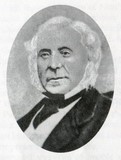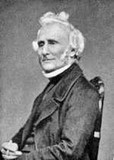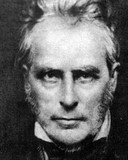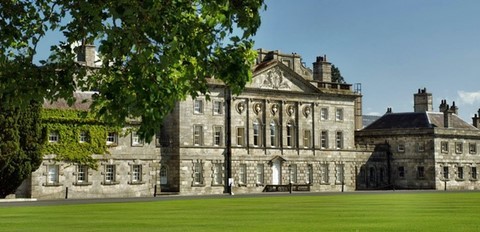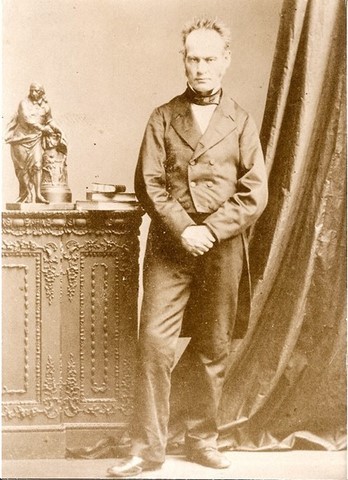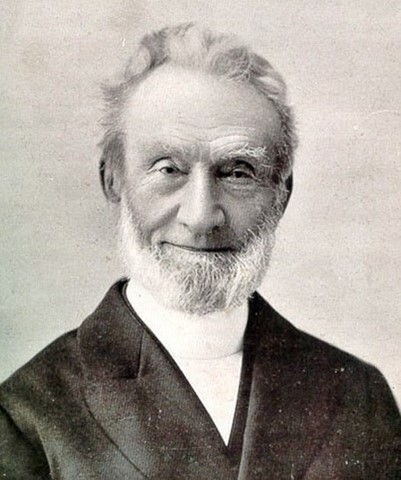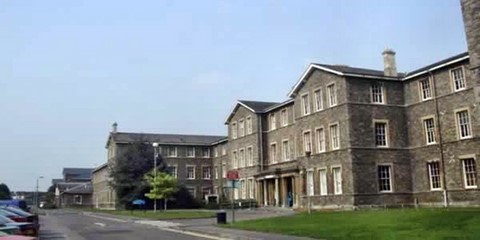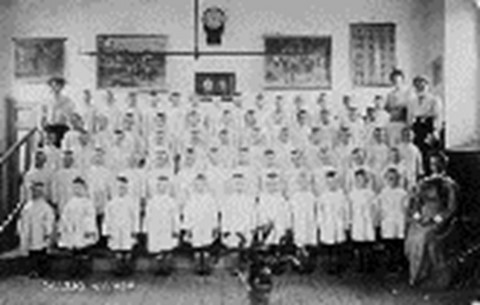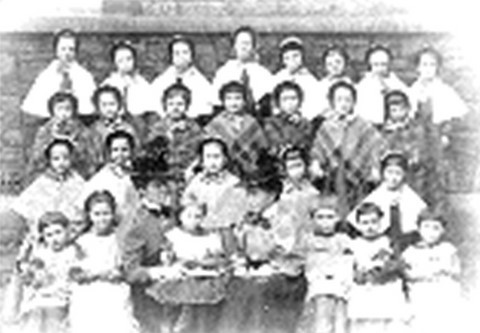The Dublin Blessing
We lived for several years in the Republic of Ireland.
While we were in Dublin, the capital city of Ireland, I found out more about a movement of God that I’ll call, “the Dublin Blessing.”
The Dublin Blessing started in Ireland nearly 200 years ago and then spread to most of the world - including New Zealand.
What happened was that a group of young men and women started meeting together for prayer and Bible study in a house in Fitzwilliam Square, in Dublin.
Among them were:
Here's part of the garden of Lady Powerscourt’s house.
These young men and women re-discovered many exciting and revolutionary truths from the Bible about the assembly or the church.
In this article I’ll use the word “assembly” instead of the word “church” because the word “assembly” is a much better translation of the Greek word "ekklesia" that is in the original manuscripts of the New Testament.
Some of the truths the young men and women in Dublin discovered I’ll call:
The Five Revolutionary Principles of the New Testament Assembly
- What the New Testament teaches about the assembly still applies today.
- The ministry in the assembly is to be done by all of the believers in the assembly.
- The assembly is to be led by a team of elders – not by only one person.
- We are to frequently remember the Lord Jesus at the Lord’s Supper.
- The Bible-based assembly is a missionary assembly.
What was revolutionary about these five principles?
They were revolutionary because they were radically different from what most churches believed and practised.
It's probably fair to say that they're still revolutionary today!
What were the results of the Dublin Blessing?
- The Dublin Blessing resulted in much intensive Bible study. There were great conferences for the study of God's Word – including some at Lady Powerscourt’s house.
- New Testament assemblies were planted in many places and evangelism became a way of life.
- A great foreign missionary movement was started.
Another major effect of the Dublin blessing was that thousands of people left unscriptural churches and joined New Testament assemblies.
Later on Edward Dennett wrote another book called "The Step I Have Taken.“ Here is the title page of my copy.
In this book he tells how through the study of the Word of God he became convinced that he was wrong in writing against the NT church.
He tells how he left the Baptist ministry and joined a New Testament assembly himself!
This was a costly move for him, as it meant that he had to give up a secure income and rely totally on the Lord.
Two other young men who left the Baptist ministry directly as a result of their study of the Scriptures were Henry Craik and George Müller. They were only 27 years old. (CBRF Journal 125, August 1992 page 9.)
Henry Craik became an outstanding and highly respected Bible teacher. Here he is, looking very distinguished!
Another result of the Dublin blessing was that a lot of church traditions were left behind.
- They got rid of special robes and ceremonies that are not in the New Testament.
- They followed closely what the Bible teaches
- They were free and adventurous in areas where they were not restricted by the Bible.
- They were like the Christians we read about in the Bible book of Acts.
Now let’s look in more detail at the first of the 5 Revolutionary Principles of the New Testament assembly.
Revolutionary Principle 1
What the New Testament teaches about the assembly still applies today.
This is quite a radical principle, because many people say that the New Testament teaching about the assembly was only for churches 2,000 years ago and does not apply today in our culture.
But the young men and women in Dublin were convinced that it does apply today.
What made them think that the New Testament assembly is for today?
They knew that everything we read in the Bible is there for a purpose:
(1 Cor 10:11) Now all these things happened to them as examples, and they were written for our admonition, upon whom the ends of the ages have come.
(2 Tim 3:16) All Scripture is given by inspiration of God, and is profitable for doctrine, for reproof, for correction, for instruction in righteousness,
They noticed that a lot of the New Testament is about the assembly. There must be a reason for this.
The Apostles planted the same kind of assembly in different countries and in different cultures; this must have some meaning for today.
The Apostles were given a unique authority as part of the foundation on which our faith is built:
(Eph 2:19,20) … you are … members of the household of God, built on the foundation of the apostles …
If the apostles were part of “the foundation” on which our faith is built – the form of assembly they gave their lives to establish must be taken very seriously.
The New Testament presents assembly matters in the “imperative mode” - not in the “indicative mode.”
This means that they are commands – not suggestions.
For example:
(1 Tim 3:15) I write so that you may know how you ought to conduct yourself in the house of God …
The "ought" is the Greek "die" which means "must".
This means that the assembly principles and practises in Paul’s letter to Timothy are compulsory and not optional.
In another passage about the assembly, Paul says:
... the things which I write to you are the commandments of the Lord. 1 Cor 14:37
It's clear that as the revolutionary principles of the Bible-based assembly are the commands of the Lord, then they do apply today.
Revolutionary Principle 2
The second revolutionary principle discovered by the young men and women in Dublin was that:
The ministry in the assembly is to be done by all of the believers in the assembly.
Why did they come to this conclusion?
The New Testament teaches that every believer is a priest ordained by God.
The assembly is composed of believer-priests.
This teaching is called “the priesthood of all believers”.
The work of the assembly is to be done by everyone in the assembly because all of the believers are priests!
(1 Pet 2:5) you … are being built up a spiritual house, a holy priesthood,…
(1 Pet 2:9) … you are a chosen generation, a royal priesthood, …
The Bible does not require a special “ordination” of priests or ministers.
Every believer has already been ordained to be a priest by God.
And because all believers are priests we don’t need:
- A special clergyman, Pastor, priest or Pope between God and us.
- We don’t need to have the Virgin Mary or the saints between God and us.
Each of us can have a personal relationship with God through the Lord Jesus.
As the apostle Paul said to the young man Timothy,
(1 Tim 2:5) … there is … one Mediator between God and men, the Man Christ Jesus…
There is also only one High Priest – the Lord Jesus.
(Heb 4:14-15) … we have a great High Priest …, Jesus the Son of God, ….
Revolutionary Principle 3
The third revolutionary principle that the young men and women in Dublin discovered from the Bible was that:
The Bible-based assembly is to be led by a team of elders – not by only one person.
They discovered that the early Christians had many problems, but the pastor-centred church was not one of them!
When they read the New Testament they immediately notice that Paul’s letters to the assemblies were not addressed to the pastor.They were addressed to:
- Romans All who are in Rome, beloved of God, called to be saints.
- 1 Corinthians To the church of God which is at Corinth, to those who are sanctified in Christ Jesus, called to be saints,
- 2 Corinthians To the church of God which is at Corinth, with all the saints who are in all Achaia:
- Galatians To the churches of Galatia.
- Ephesians To the saints who are in Ephesus, and faithful in Christ Jesus:
- Philippians To all the saints in Christ Jesus who are in Philippi, with the bishops and deacons:
- Colossians To the saints and faithful brethren in Christ who are in Colossae.
Not even one of Paul’s letters is addressed to:
- the Pastor or the Senior Pastor
- the Minister or the Archbishop or the Vicar
- the Most Reverend or the Cardinal or the Pope or Your Excellency
This would have been a very rude if there had been a special leader over any of the New Testament assemblies.
So who leads Bible-based assemblies? The Bible teaches that they are led by teams of men called elders.
As we read in Acts 14:23:
So when they had appointed elders in every church (or assembly), and prayed with fasting, they commended them to the Lord in whom they had believed.
They did not appoint a vicar or a pastor or a minister - they appointed elders.
Whenever the elders or leaders of a particular assembly are referred to in the Bible, it is always in the plural.
This is because there is always more than one elder leading a New Testament assembly.
What about Pastors?
In the Bible a pastor is a shepherd, a person who cares for the sheep.
A pastor is a believer who is used by God to give spiritual help and guidance to other believers.
The Bible tells us:
- The qualifications of elders (Titus 1:5-9)
- The qualifications of deacons (1 Tim. 3:8-13)
BUT the Bible does not tell us the qualifications of pastors. Why?
This is because the Bible teaches that the elders are responsible both to lead and to pastor the assembly (Acts 20:17,28 and 1 Pet 5:1-2).
There may also be others in the assembly with the spiritual gift of “pastor”, (Eph 4:11), but this is not a leadership position.
This means that Bible-based assemblies can have many pastors to give spiritual help to the sheep.
In 1 Peter 5:4 we are told that the Lord Jesus Himself is the Senior Pastor.
Revolutionary Principle 4
The young men and women in Dublin discovered another revolutionary principle of the Bible-based assembly:
We are to frequently remember the Lord Jesus at the Lord’s Supper.
The Lord’s Supper is very important because it was the only gathering of believers specifically asked for by the Lord Jesus.
Unfortunately in some churches today the Lord’s Supper is not thought to be important.
But the Lord Jesus especially requested his people to remember Him in this way, so it is very important.
How often should we have the Lord’s Supper?
Although the Bible does not tell us how often we should have the Lord’s Supper, it is so important that it is good to have it often.
At first the assemblies of believers celebrated the Lord’s Supper more than once a week—probably every day (Acts 2:42-46).
Later, they changed to a weekly celebration on the first day of the week (Acts 20:7)—probably because it was not practical to meet every day.
Writers from the first and second centuries tell us that a weekly celebration of the Lord’s Supper was normal after the time of the New Testament.
We can read about this in Didache 14:1, Justin Martyr Apologia l, 67 and Barnabas 15:9.
A Bible-based assembly will usually celebrate the Lord’s Supper at least once a week.
There are many benefits from having the Lord’s Supper frequently.
In many churches the focus of attention is not on the Lord Jesus, but on popular musicians, worship leaders, programmes and entertainment.
Unfortunately churches that rely on exciting programmes to entertain the crowds can slowly drift away from an emphasis on the gospel and the centrality of the Lord Jesus.
Shallow worship creates shallow Christians.
Entertainment worship breeds entertainment Christians.
But assemblies that keep the Lord Jesus at the centre of their life and worship are more likely to remain true to the Word of God.
The Lord’s Supper helps us to keep the Lord Jesus at the centre of our life and worship.
Revolutionary Principle 5
The young men and women in Dublin discovered from the Bible that:
The Bible-based assembly is a missionary assembly.
Every disciple of the Lord Jesus except one became a missionary, and Judas – the disciple who didn't become a missionary – became a traitor.
Many churches today have become so self-centred that they have forgotten about the Lord’s command to “go into all the world and preach the gospel.” (Mark 16:15)
They spend all their money on professional staff to do all the hard bits for them – and have little left over for their missionaries.
The Lord Jesus gave His final instructions to His disciples just before He left them. He said,
Go therefore and make disciples of all the nations,
baptising them in the name of the Father and of the Son and of the Holy Spirit,
teaching them to observe all things that I have commanded you…
(Matthew 28:18-20).
There are many millions of people who have never heard the gospel of free salvation through faith in the Lord Jesus.
Every Christian needs to get involved in this mission of taking the gospel of salvation to the world.
Summary
There is a New Testament pattern for the local church, and it still applies today.
It is simple, it is flexible, and it has survived the tests of time and persecution.
Most churches today ignore the New Testament pattern, but we should aim to follow it if we love God's Word.
However we must always remember, that no matter how “correct” we are in the way we operate our assembly, in the final analysis it's loyalty to Christ that counts.
Christ must be at the centre of our lives and our families.
We should remember that:
We’re not here permanently, and we’re not here to sit still.
This world is not our final home.
We are on a journey, a journey from earth to glory. We are pilgrims.
The NT is full of "doing words". We are told to "press on", to "fight the good fight", to "run the race"
So like those men and women in Dublin so long ago;
let’s get excited about the Truth!
Lindsay Smith 3/3/18
